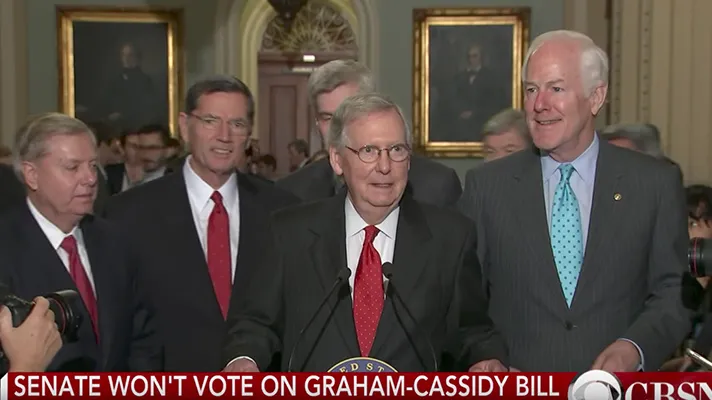
The Graham-Cassidy healthcare bill, the GOP's latest attempt to repeal and replace the Affordable Care Act, sputtered out Tuesday before it had a chance to hit the floor of Congress, and provider groups are cheering its quiet demise.
Michael Munger, MD, president of the American Academy of Family Physicians, released a statement this week expressing satisfaction that the Senate -- at least temporarily -- has abandoned its effort to replace the ACA, saying, "We call on Congress to return to bipartisan negotiations aimed at amending and improving current law, not repealing it."
[Also: Senate GOP pulls Graham-Cassidy bill to avoid vote defeat]
Munger urged the Senate to improve current law by expanding access to affordable coverage, stabilizing the insurance markets and lowering healthcare costs, for which he said there are bipartisan solutions.
""We cannot and will not support any legislation that results in loss of coverage, removes protections for patients with pre-existing conditions, and threatens the affordability and accessibility of health care for those who rely on Medicare and Medicaid," he said.
[Also: Collins's decision to vote 'no' on Graham-Cassidy likely dooms bill]
American Hospital Association President and CEO Rick Pollack expressed similar sentiments, saying that Graham-Cassidy's failure shouldn't be construed as a loss or victory for one side or the other, but a catalyst for crafting more effective reform.
"The Graham-Cassidy proposal has had the same result as similar attempts to repeal parts of the Affordable Care Act because its enactment would have entailed similar consequences: devastating cuts to the Medicaid program, the loss of coverage for tens of millions of Americans, eliminated consumer protections for people with pre-existing conditions and destabilized insurance markets," wrote Pollack.
[Also: Healthcare would lose 580,000 jobs under Graham-Cassidy, S&P says]
American Psychological Association President Antonio E. Puente, PhD, reserved special praise for Republican Senators John McCain of Arizona and Susan Collins of Maine, who broke with party ranks and essentially tanked the bill by pledging not to vote for it.
Of particular concern to Puente was the bill's possibly deleterious effects to Medicaid, which is the coverage for many Americans who deal with mental health issues.
"Medicaid is more cost-effective than private-sector coverage and is a lifeline for millions of Americans with mental health and substance use disorders and other chronic health conditions," said Puente in a statement. "In addition to slashing federal Medicaid spending by $1 trillion over the next 10 years, passage of the Graham-Cassidy bill would have defunded the Prevention and Public Health Fund, curtailed access to reproductive health services, and dealt a major blow to our nation's ability to bring an end to the opioid epidemic."
The American Association of Retired Persons also joined the chorus, with executive vice president Nancy LeaMond writing on the group's website this week that the voices of the American people are "very powerful."
"Instead of this harmful bill, we strongly urge Congress to find bipartisan solutions for the problems in our healthcare system," said LeaMond. "Older Americans and their families need health care they can afford and rely on."
Twitter: @JELagasse
Email the writer: jeff.lagasse@himssmedia.com